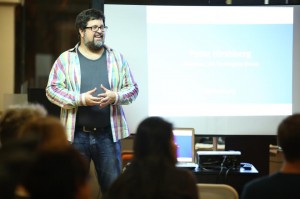Chris Messina had an interesting post called “The future of open leadership” which I felt compelled to respond to. I generally get where Chris is coming from and agree with a lot of the core stuff (after all, one of my practice areas with Conversal was ‘transforming the heart of business’) but much of the way it is presented and the pervasive anti-establishment perspective does not sit well with me. It seems that many people of late are advocates for throwing the baby out with the bath water – instead of seeing things as they really are, everything is colored by their personal experience and perspective> People are more apt to associate something they dont like (such as the abuse of power) with something funamental (such as leadership) and thinking we need to re-invent the fundamentals. We don’t – we need to help people reach back to their roots and re-introduce the fundamentals as what they really are. Here is my broad sweeping response to his post which I also included in his comments:
I don’t see what is so different between open source leadership and plain ole good leadership other than the new roles that are required for managing the unique tasks. You may need a distinction of semantics for a given group of people to respond more positively, but good leadership is not dictatorial in nature, though it could be in certain circumstances. If you can find some time, study some of the classics on leadership and you will find more of this – we don’t need to reinvent the wheel when so much has been done previously.
On a separate note, I don’t know that you can accurately claim and take credit for a “BarCamp model of leadership” given that Open Space has been in use for decades and that BarCamp’s use of the format was borrowed (or inspired) from Foo Camp. While it certainly has successfully been applied all over the world with BarCamp and you are deserving of some credit for it, I again say that it is simply good leadership you are referencing, not anything new that has been recently invented. That aside, I think what you are really looking for in this inquiry is this: leadership can be ephemeral, moving from person to person around the group (ala talking sticks and other methods) with each person becoming a leader as they share with the group. Hosting conversations as we both do, this is the primary driver of the current day phenomenon – that everyone can be a leader, if only for a short while, when the group is focused on listening to them. That is a form of good leadership, but so is making a tie-breaking decision on a 50-50 vote in which not everyone will be pleased with your choice. We want to model and encourage more emergent leadership in this way, because this experience of leadership will lead to broader self-empowerment and I think, a stronger society. It is the experience one has when seeing good leadership in action that provides the possibility for growth and that does not happen nearly enough in the world today.
Within my study of open space and hosting conversations I have found that the agreed upon structure of the gathering is where constraints can be used to move to some sort of closure – but someone must be the benevolent facilitator/leader to keep people moving within the agreed upon framework/structure. In a very real sense, the actions that need to be performed (such as closing debate on a given issue to move on to the next) are not as important as the intentions with which they are performed. ie, you are not being an ogre for needing to cut off someone who is repeating the same thing over and over again, you are looking out for the best interests of the group – at least insofar as the intentions are not about shutting out someone to keep power for yourself, but the intentions are that of leading the group to its stated outcomes.
If you are just leading an ever growing conversation without getting to its conclusion or the desired outcome, that is not leadership, that is hanging out shooting the sh!t – it seems to be the same problem that the democrats have unfortunately embraced for too long. The structures for operating a representative style government is based on this, but they include limits as well. While one party may misuse those limits/rules to serve their own interests for power, that was not the original purpose of the design. Open participation in a community process is terrific, but in the end, the community has needs for things getting done and that is paramount.
As we all gain more experience with the process of “moving from me to we”, this view of good leadership will become clearer – leadership is still needed and it should not be wed to the common perceptions of greed, mistrust and abuse of power as I some people are trying to do. Because some bad leaders have misplaced our collective trust is not a reason to throw out the principles of good leadership and start your own movement and buzzwords. Discussing the applicability of leadership principles to community driven projects however, is a very worthwhile discussion and I will enjoy reading more of that from Mitchell’s perspective.
